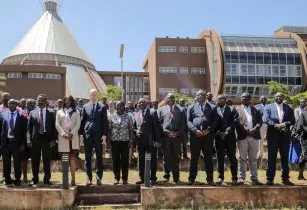The Global Centre on Adaptation (GCA) in collaboration with the African Development Bank (AfDB) and the Wangari Mathai Institute recently concluded a three-day regional forum on the future of resilient food systems in Africa
The Forum, called the Future of Resilient Food Systems in Africa – AAAP Digital Solutions for a Changing Climate provided training aimed at strengthening the capacity of stakeholders from across Eastern Africa. The primary objective was to design and implement solutions to improve food security and climate resilience and to facilitate knowledge sharing among farmers on approaches to scale up the use of Digital climate-informed advisory services (DCAS).
DCAS includes tools and platforms that integrate climate information into agricultural decision-making, ranging from digital mobile apps, radio, and online platforms to digitally enabled printed bulletins based on climate models and extension services that utilise climate information platforms.
DCAS offers crucial opportunities to build the resilience of small-scale producers in the face of worsening climate change impacts. From seasonal forecasts to pest advisories, effectively designed services provide producers with the resources to adapt to climate shocks and plan for new climate conditions.
Speaking at the opening ceremony of the forum, Patrick Verkooijen, CEO of GCA called for urgent financial support to put Africa on the path of food sovereignty.
“Africa needs urgent support to scale up the implementation of adaptation solutions that are already yielding good results for irrigation, developing drought-resistant seeds, crops and livestock diversification,“ he said.
“Through the African Adaptation Acceleration Programme (AAAP), we are rolling out a US$350mn project to build resilience for food and nutrition security in the Horn of Africa towards mobilising new digital climate technology for market information, insurance products, and financial services that can and must be tailored to smallholder farmers’ needs”, he added.
Furthermore, Stephen Kiama Gitahi, vice chancellor of the University of Nairobi, reiterated the relevance of the forum, pointing out that 70% of the population in eastern Africa live in rural areas and depend on agriculture for their livelihoods. He encouraged the trainers to simplify the modules in a manner that removes the fear for technology and accelerate adaptation for rural farmers.





